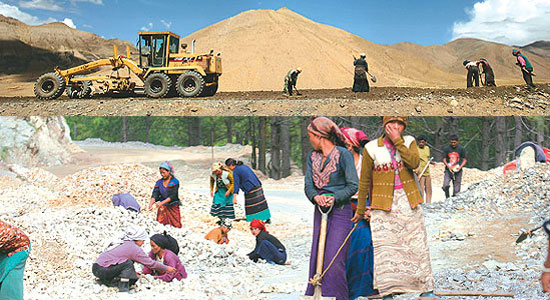
Stark contrast: A road being constructed in the China-administered Tibet Autonomous Region; and below, one being laid on the Indian side, in Arunachal Pradesh’s Tawang region
With India having given them nothing but neglect, the Arunachalis wonder if they’d have been better off with China
By Saikat Datta
• Flashpoint 1 Appalling infrastructure makes Arunachalis wonder how New Delhi can ignore such a sensitive border state
• Flashpoint 2 It’s particularly shameful when you look at all the development just across the border, on the Chinese side
• Flashpoint 3 There is resentment over dilution of tribal identity, especially on account of the imposition of Hindi
• Flashpoint 4 A corrupt electoral system is helping elect people who have the money but don’t necessarily represent people
• Flashpoint 5 Hydel projects will lead to influx of migrants and hasty environmental
clearances will wreak havoc
***
Travelling through the plains of upper Assam one late October afternoon, wending our way from picturesque Tawang to Arunachal’s capital Itanagar, an irony keeps hitting us at every turn. To access one part of Arunachal from another, we must suffer this tedious journey through Assam. It’s here that we run into Ritesh (name changed), an indigenous Arunachali who’s a journalist with a government media agency based in Itanagar. He recalls the day he went across the McMahon Line, which divides India from China, for the first time in his life—and saw what China was all about. Actually, Ritesh didn’t really see mainstream China but the region euphemistically called the Tibet Autonomous Region (TAR).
Ritesh could cross the McMahon Line because of a tradition that the Indian and Chinese military follow diligently every year. On August 15, a Chinese delegation crosses over to Tawang at Bum La; on October 2, to commemorate the Chinese National Day, an Indian delegation crosses over into TAR. On these two days, both sides jointly hoist the respective flags of their countries. Amidst bonhomie, each delegation shows off its country’s achievements to the other. It was on one such trip that Ritesh witnessed China’s progress. “The roads were beautiful,” he reminisces, “the villages swank and the infrastructure fantastic. Then I recalled the road I’d taken from Tezpur over two days to get there and I began to wonder where Arunachal would have been had it continued under China post-1962.”
The visit was a mind-bending experience for Ritesh, prompting him to take a relook at his assumptions, at the idea of India he had inherited. He, after all, belongs to what can be called the post-’62 generation, those born in the years following the Indo-China conflict. They know of China as the aggressor, an image recurring in the narration of their grandfathers. Now, however, Ritesh has seen the other China—a superpower in the making, hurtling down the road to development at breakneck speed.
.jpg)
Whose goose is being cooked: Arunachali tribals resent the loss of their way of life and dilution of their tribal identity
Quite understandably, China dominates the thoughts and memories of most Arunachalis. The tribes here still lingered in their pre-industrial ways of life when in October 1962, as the winter chill set in, the Chinese stormed into India through Bum La on the west and the Dibang valley in the east, sweeping past Indian defences to advance to the gates of Tezpur in Assam. The ’62 war sent shock waves countrywide. But for Arunachalis—indigenous people aeons away from the mainstream in material culture—a modern war machine playing out its drama on their territory marked the end of innocence. Indeed, 1962 isn’t just a year for them. For many, it is the beginning of the end.
Says Moji Riba, an erudite and articulate filmmaker whose father was briefly the chief minister years ago, “Our society developed at such a speed that we couldn’t catch up post-’62. Most people like my grandfather never saw a wheel when they emerged from the jungles. And yet, they saw jets flying in the air. From pre-wheel to jet age in 40-odd years, can any society evolve in this manner without consequences?”
Outlook for more
